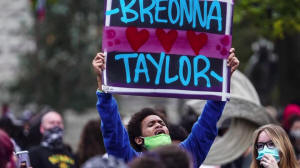Louisville anti-racism protests resume amid tensions over Breonna Taylor
ruling
 Send a link to a friend
Send a link to a friend
 [September 25, 2020]
By Carlos Barria and Bryan Woolston [September 25, 2020]
By Carlos Barria and Bryan Woolston
LOUISVILLE, Ky. (Reuters) - A second night
of anti-racism protests got off to a tense but mostly peaceful start in
Louisville, Kentucky, on Thursday, a day after a grand jury decided not
to bring homicide charges against police officers involved in the fatal
shooting of Breonna Taylor.
As a curfew went into effect after dark and police declared an unlawful
assembly, a group of 200 to 300 protesters who had marched through the
city for hours retreated to the grounds of the First Unitarian Church,
set aside by organizers as a sanctuary near the Ohio River waterfront.
Some of the marchers had smashed windows of several local businesses,
and even a hospital, along the way, according to a Reuters journalist.
But the scene outside the church contrasted sharply with violence that
flared the previous night in Kentucky's largest city.
"At least 24 people were arrested throughout the evening for charges
including unlawful assembly, failure to disperse and riot in the first
degree," the Louisville Metro Police Department (LMPD) said in a
statement.

Angry demonstrations and sporadic clashes between police and protesters
in the hours following the grand jury announcement turned bloody late on
Wednesday when two police officers on crowd-control duty were shot and
wounded.
A suspect was arrested a short time later, and Louisville police chief
Robert Schroeder said on Thursday that the two wounded officers were
expected to recover.
Schroeder, his department reinforced by state police and Kentucky
National Guard troops, said he expected protests to continue for days,
and a nighttime curfew was extended through the weekend.
"For all of us it is a very tense and emotional time," Schroeder told a
news conference on Thursday. Police said 127 arrests were made in the
first night of protests, most for curfew violations or disobeying orders
to disperse.
The protests began on Wednesday after the grand jury decided that none
of the three white officers who collectively fired 32 gunshots as they
stormed Breonna Taylor's apartment would be charged with causing her
death.
One of the officers was indicted on charges of endangering Taylor's
neighbors with several stray bullets he fired into an adjacent apartment
during the March 13 raid, carried out as part of a narcotics
investigation. The other two officers were not charged at all.
Taylor, 26, a Black emergency medical technician and aspiring nurse, was
struck by six bullets moments after she and her boyfriend, Kenneth
Walker, were roused from bed in the commotion of the raid. Walker
exchanged gunfire with the police.
GRAND JURY RULING DECRIED
The grand jury decision, announced by Kentucky Attorney General Daniel
Cameron, was immediately denounced by civil rights advocates as the
latest miscarriage of justice in a U.S. law enforcement system corrupted
by racial inequity.
Cameron said there was "no conclusive" evidence that any of the 10 shots
fired by former Detective Brett Hankison, the officer indicted on wanton
endangerment charges, ever struck Taylor.
His two colleagues, Sergeant Jonathan Mattingly and Detective Myles
Cosgrove, used justified force under Kentucky law because they were
returning fire - a combined total of 22 rounds - after Walker shot at
them first, wounding Mattingly in the thigh, according to Cameron.
[to top of second column]
|

Activists chanted Taylor's name on the streets of Louisville, New
York City, Pittsburgh and Oakland, after a grand jury declined to
charge police officers for killing the African-American emergency
medical technician in a botched raid. This report produced by
Zachary Goelman.

Walker has said he fired a warning shot because he feared a criminal
intrusion and did not hear police identify themselves.
Wednesday's protests turned violent around nightfall as police in
riot gear ordered demonstrators to clear the streets after several
fires were set in trash cans near a downtown park and outside the
city's Hall of Justice.
A Reuters journalist heard several gunshots ring out, and members of
the crowd scurried for cover. An arrest report said the accused
gunman, Larynzo Johnson, 26, was seen on video opening fire on
police with a handgun.
Johnson was charged with two counts of assault in the first degree
and 14 counts of wanton endangerment. His first court hearing was
set for Friday.
Police said several businesses were vandalized or looted during the
night, but the demonstrations were otherwise mostly peaceful.
Protests also flared on Wednesday in New York, Los Angeles, Atlanta,
Washington, Oakland, Philadelphia, Denver and Portland, Oregon,
Seattle and Buffalo, New York.
Taylor's slaying initially drew little national attention. But it
was thrust into prominence after George Floyd, a Black man arrested
for a non-violent offense in Minneapolis, died under the knee of a
white police officer on May 25, igniting a summer of protests
against racial injustice and excessive police force.
Hankison was fired in June, while Mattingly and Cosgrove were
reassigned to administrative duties.
Louisville has agreed to pay $12 million to Taylor's family to
settle a wrongful-death lawsuit.

In addition to largely orderly activists, the demonstrations have
drawn a volatile mix of armed, right-wing militias and anarchists.
On Thursday evening in Louisville, a throng of protesters was seen
by a Reuters journalist confronting a group of about 15 armed
individuals dressed in military-style gear who identified themselves
as members of the Oath Keepers, an organization associated with the
militia movement.
The standoff was diffused when protest organizer persuaded
demonstrators in their group to leave peacefully. Two of the Oath
Keepers, one of them a Black man, told WAVE-TV they were in town as
volunteers to protect local property.
(Reporting by Carlos Barria and Bryan Woolston in Louisville;
Additional reporting by Peter Szekely, Nathan Layne, Maria Caspani
and Daniel Trotta; Additional reporting by Aishwarya Nair in
Bengaluru; Writing by Daniel Trotta and Steve Gorman; ;Editing by
Leslie Adler and Daniel Wallis)
[© 2020 Thomson Reuters. All rights
reserved.] Copyright 2020 Reuters. All rights reserved. This material may not be published,
broadcast, rewritten or redistributed.
Thompson Reuters is solely responsible for this content. |